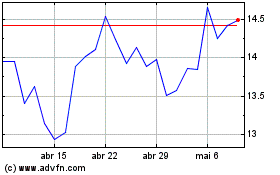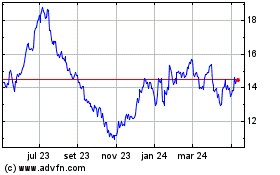By Akane Otani
Investors who began the year feeling largely sanguine about the
stock market are struggling to make sense of whether a growing
coronavirus outbreak could upend their bets on a global economic
recovery.
Just days ago, global stocks looked poised to close out January
on a strong note. Benchmark indexes from the S&P 500 to the
Stoxx Europe 600 to India's S&P BSE Sensex climbed to records.
Investors projected that with issues including the U.S. and China's
trade war and central-bank rate increases in the rearview mirror,
the global economy would likely be able to stage a modest rebound
in 2020.
Now that view is being tested. The viral outbreak that
originated in Wuhan, China, has infected thousands and spread to
the U.S., Japan, South Korea and other countries. The disease
threatens to hamper an already-slowing Chinese economy, in turn
potentially jeopardizing the global recovery that many investors
had counted on to materialize this year.
Markets bounced higher Tuesday, paring losses after anxiety over
the outbreak sent stocks from Japan to Germany to the U.S. to their
biggest one-day declines in months Monday.
"I don't think markets anticipated how contagious this disease
has proven to be and how quickly it's spreading," said Michael
Farr, president and chief executive of investment-management firm
Farr, Miller & Washington.
Over the past several months, Mr. Farr said his firm has been
gradually selling some of its riskier investments, reasoning that
the stock market had already managed to run up well past what most
had expected in 2019.
"It really has yet to be seen whether this [downturn] will gain
traction or not," Mr. Farr said. "But it certainly seems like the
ingredients for a further decline are coming together."
Experts caution that it is still too early to understand how big
an economic impact the virus will have. So far, health officials
say the Wuhan virus appears to be less severe than prior strains,
such as the SARS coronavirus.
During prior outbreaks, markets proved resilient.
Charles Schwab analysts found the MSCI World Index declined 5.5%
in the month after January 2016, when the Zika virus spread to
several countries, but returned 2.9% over the course of six months.
In their analysis of 13 outbreaks since 1981, analysts at the firm
found the index returned an average of 0.8% over a one-month period
following an outbreak and 7.1% over a six-month period.
Morningstar analysts came to a similar conclusion, finding that,
among the companies they covered, none suffered a long-term effect
from the 2003 SARS outbreak.
In other words, even when stocks have taken a short-term hit
from disease-related worries, they have tended to bounce back in
the following months. That is because in recent decades it has been
rare, if not unheard of, for a contagious disease to bring consumer
spending to a halt around the world.
Nevertheless, the timing of this year's outbreak is in some ways
more worrisome than in prior cases. Data earlier in the month
showed China's economy grew 6.1% in 2019. While that increase was
within the government's target, it marked the slowest pace of
expansion for the world's second-largest economy in nearly three
decades.
Should the coronavirus outbreak fail to stabilize by March,
first-quarter growth in China could slow to below 6%, Société
Générale economists said in a report.
Making matters worse, the latest outbreak is spreading in the
midst of the Lunar New Year holiday, when millions of Chinese
citizens typically travel to visit their families. And China's
economy is more interconnected to the global economy than it was
when the SARS outbreak occurred in 2003, meaning a slowdown there
could have widespread ramifications.
Even just days into the deepening crisis, markets outside China
have been hit by volatility.
Copper has fallen for nine straight days in their longest losing
streak since October 2016. Prices for the industrial metal tend to
pick up when investors are more optimistic about the prospects for
economic growth.
Shares of airlines and casino operators such as Wynn Resorts
Ltd., Las Vegas Sands Corp. and American Airlines Group Inc. have
dropped, reflecting investors' anxieties about a potential pullback
in travel spending.
In the U.S., the S&P 500 ended Monday down 1.6%, marking its
worst session since October. The broad index rose 1% on
Tuesday.
Some analysts believe markets may still have further to fall
before they bottom out.
Morgan Stanley analysts predicted the S&P 500 could drop as
much as 5% before the current stretch of declines is over. That
assessment was based on the view that stocks had already run up
past what economic data justified, making them appear vulnerable to
a drawdown even before the coronavirus outbreak began.
Ultimately, though, money managers have more questions than
answers.
During the SARS outbreak in 2003, "the hit to economic growth
was measurable, albeit short-lived," said Katie Nixon, chief
investment officer at Northern Trust Wealth Management, in emailed
comments.
The extent to which the markets slide this time around will
depend on "the length, depth and breadth of the economic impact" of
the outbreak, Ms. Nixon said, adding that she would be carefully
monitoring news reports in the coming days.
Write to Akane Otani at akane.otani@wsj.com
(END) Dow Jones Newswires
January 28, 2020 18:51 ET (23:51 GMT)
Copyright (c) 2020 Dow Jones & Company, Inc.
American Airlines (NASDAQ:AAL)
Gráfico Histórico do Ativo
De Mar 2024 até Abr 2024

American Airlines (NASDAQ:AAL)
Gráfico Histórico do Ativo
De Abr 2023 até Abr 2024
